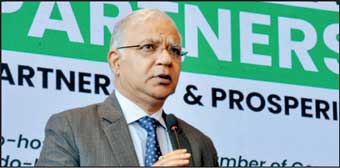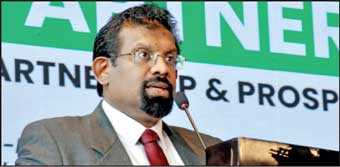Tuesday Feb 24, 2026
Tuesday Feb 24, 2026
Wednesday, 5 November 2025 00:00 - - {{hitsCtrl.values.hits}}
 |
| Ceylon Chamber of Commerce Vice Chairperson Bingumal Thewarathanthri |
 |
| Indian High Commissioner to Sri Lanka Santosh Jha |
 |
| National Agency for Public Private Partnership CEO Dr. Sulakshana Jayawardena |
By Charumini de Silva
The High Commission of India, in collaboration with the Ceylon Chamber of Commerce (CCC), yesterday hosted a high-level forum in Colombo titled “PPP: Partnership and Prosperity for People”, bringing together Government officials, policymakers, private sector leaders and development partners to discuss pathways for unlocking Sri Lanka’s Public–Private Partnership (PPP) potential.
The event comes as the Government finalises long-awaited PPP legislation aimed at driving investment across key sectors such as ports, aviation, energy, and education.
Opening the discussion, CCC Vice Chairman Bingumal Thewarathanthri said the Chamber has long championed the PPP concept as a mechanism to bridge Sri Lanka’s investment gaps and stimulate growth through joint public and private sector participation.
“The Chamber has been working on PPPs for years, but these conversations have largely been confined to budget discussions. Not that we never had PPPs; we’ve had great examples in the past such as the South Asia Gateway Terminals (SAGT), Port of Colombo, but the time has come to relook at this opportunity seriously,” he said.
He observed that Sri Lanka is entering a crucial phase where stabilised reserves, declining global interest rates, and improved fiscal discipline provide a conducive environment for renewed investor confidence. “With the US interest rates coming down, global capital is gradually flowing back into emerging markets. This is an opportunity for Sri Lanka to position itself strategically to attract investment,” Thewarathanthri opined.
He stressed that while the country has achieved a measure of economic stability, there is a pressing need to expand development momentum through credible partnerships. “There is space for development and expansion, and that’s where PPPs can play a transformative role,” he noted.
Thewarathanthri also asserted that any successful PPP framework must be built on trust, mutual respect and accountability between the Government and private sector.
“Partnerships only work when both parties respect each other’s roles. That trust factor is fundamental to making PPPs succeed,” he added, pointing to numerous examples of successful collaborations across the region.
Indian High Commissioner to Sri Lanka Santosh Jha underscored the deep economic and developmental ties between India and Sri Lanka, describing PPPs as a cornerstone of India’s growth story and a model that could inspire Sri Lanka’s reform journey.
“India and Sri Lanka share geography, history and culture, but also a deep and dynamic economic relationship. Our businesses are connected through investment, energy, infrastructure, tourism, technology, and manufacturing. As Sri Lanka continues its journey of economic recovery and growth, India stands ready as a reliable and close partner,” he said.
Highlighting India’s two decades of PPP experience, the High Commissioner said such partnerships have been “game changers” in areas ranging from national highways and renewable energy to healthcare and digital infrastructure.
“PPPs have allowed India to leverage the innovation, efficiency, and investment of the private sector to achieve public goals,” he said.
He added that the PPP model’s flexibility and scalability make it suitable not only for large infrastructure projects but also for local-level services such as municipal waste management and rural water supply. “At the heart of a thriving democracy lies the ability to deliver better infrastructure and services to every citizen. Whether its digital inclusion, clean water, reliable electricity, or healthcare, the last mile defines the real success of governance,” he elaborated.
Jha noted that India and Sri Lanka could jointly pioneer modern PPP frameworks that serve as templates for the Global South. “With our shared priorities and complementary strengths, our two countries can co-create partnerships that not only serve our people, but also inspire others,” he added, reaffirming India’s commitment to support Sri Lanka’s PPP journey through technical and institutional collaboration.
Providing a comprehensive overview of Sri Lanka’s evolving PPP landscape, National Agency for Public–Private Partnership (NAPPP) CEO Dr. Sulakshana Jayawardena outlined the institutional and legal steps taken by the government to revitalise the framework.
He recalled that the first formal PPP unit was set up in 2017, later transformed into the National Agency for Public–Private Partnerships, but its activities slowed during the economic challenges of 2020–2022.
Recognising the urgent need for renewed investment in infrastructure and public services, the Government reactivated the NAPPP and strengthened its legal foundation through the Public Finance Management Act No. 44 of 2024.
“The objective of this legislation is to introduce a transparent and efficient investment mechanism. The Act provides for the establishment of a Public Investment Committee (PIC) under the Finance Ministry, which will evaluate proposals with inputs from the Department of National Planning to determine whether they should be implemented with public funds or through PPPs,” he said.
Dr. Jayawardena noted that several enabling regulations and procurement guidelines are already being prepared to operationalise the PPP law once enacted. “We are also working closely with development partners such as the ADB, World Bank, and IMF to finalise the manuals and frameworks that will support implementation,” he stated, adding that 67 projects have already been identified as potential PPPs across sectors like transport, water, and energy.
He also emphasised the need for strong institutional capacity and coordination between line ministries. “The NAPPP’s role is not just regulatory, we work alongside implementing agencies to provide technical and advisory support throughout the project cycle, from preparation to operation,” he explained.
In recent months, the NAPPP has conducted several capacity-building and awareness programmes for public officials across agencies including the Road Development Authority, Ceylon Electricity Board, and Water Board. “Strengthening institutional knowledge and understanding of PPPs is essential to ensuring their long-term success,” Dr. Jayawardena said.
He expressed appreciation to the CCC, Indian High Commission and other partners for their constructive feedback during stakeholder consultations.
“This collaboration has been vital in refining the draft PPP Bill and ensuring it reflects both private sector expectations and public policy priorities,” he said.
The event, attended by senior Government officials, MPs, industry leaders, and representatives from international donor agencies, underscored the growing consensus that PPPs will be central to Sri Lanka’s infrastructure revival and sustainable economic growth agenda in the years ahead.